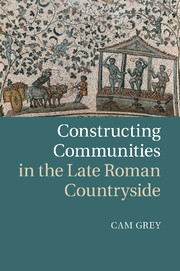Book contents
- Frontmatter
- Contents
- Preface
- List of abbreviations
- Map The late Roman world (sites and regions discussed in the text)
- Introduction
- Chapter 1 Constituting communities
- Chapter 2 What really matters
- Chapter 3 Small politics
- Chapter 4 Power as a competitive exercise
- Chapter 5 Resistance, negotiation, and indifference
- Chapter 6 Creating communities
- Chapter 7 Unintended consequences
- Conclusions
- Bibliography
- Index
Chapter 6 - Creating communities
taxation and collective responsibility
Published online by Cambridge University Press: 07 September 2011
- Frontmatter
- Contents
- Preface
- List of abbreviations
- Map The late Roman world (sites and regions discussed in the text)
- Introduction
- Chapter 1 Constituting communities
- Chapter 2 What really matters
- Chapter 3 Small politics
- Chapter 4 Power as a competitive exercise
- Chapter 5 Resistance, negotiation, and indifference
- Chapter 6 Creating communities
- Chapter 7 Unintended consequences
- Conclusions
- Bibliography
- Index
Summary
In the late third century, the emperor Diocletian and his colleagues in the Tetrarchy instituted a series of reforms that ushered in a new system of tax assessment, and produced a fundamentally different administrative landscape. This new tax system provided authors of the period with a rich rhetorical vocabulary, and an infinitely exploitable set of images and moral topoi. It emerges from the sources as corrupt, burdensome, and intrusive, an unwieldy monster that ultimately brought about the downfall of the Roman res publica. The individuals involved in its apparatus of assessment and collection appear little better than bandits, their attentions unwelcome, their actions the very epitome of the abusive exercise of power and the illegitimate use of force, their demands eliciting fear, flight, and active resistance.
Scholars have long debated the extent to which the changes implemented under the Tetrarchy impacted upon existing networks of asymmetrical and symmetrical relations in the countrysides of the late Roman world. These debates have tended to revolve around two quantitative measures. First, attention focuses upon the tax burden itself, which appears to have grown in the period as the fiscal demands of the state increased. Second, our evidence gives the impression that the personnel involved in the assessment and collection of taxes expanded dramatically as well. Caution is necessary, however, lest we overstate the scale and impact of these increases. Certainly, complaints about heavy taxation in the period are common, but orders of magnitude are impossible to recover, and complaints by themselves are a somewhat unreliable marker. When we turn to the bureaucratic machinery of tax assessment and collection, we are similarly hampered by unreliable figures. In Egypt, the only province where sufficient evidence exists for statistical arguments to be made, the administrative bureaucracy of the period does not appear to have been an overwhelming presence – on the contrary, a recent study has put the proportion of officiales to provincials at 1 to 2,400. Therefore, while it seems reasonable to posit some quantitative increase in the imperial bureaucracy of the period, that increase was perhaps not as massive as was once thought.
- Type
- Chapter
- Information
- Constructing Communities in the Late Roman Countryside , pp. 178 - 197Publisher: Cambridge University PressPrint publication year: 2011



